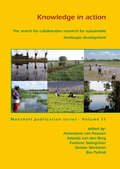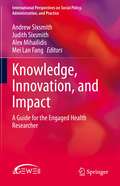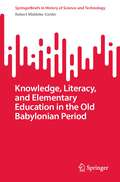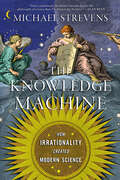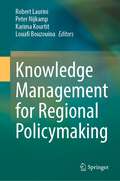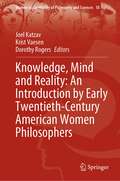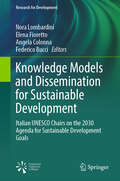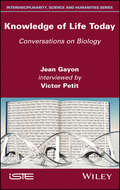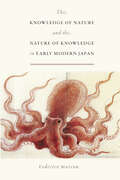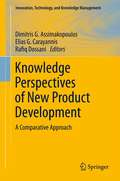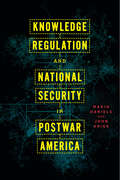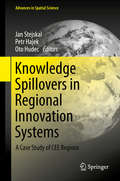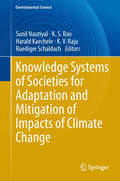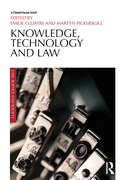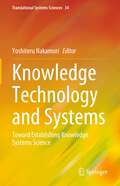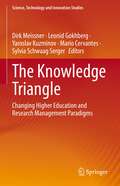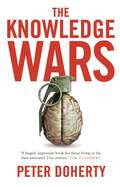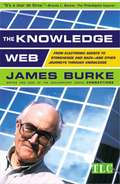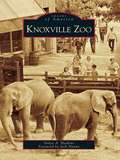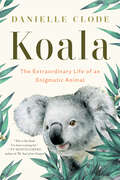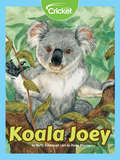- Table View
- List View
Knowledge in Action
by Jolanda van den Berg Annemarie Van Paassen Eveliene Steingröver Bas Pedroli Renate WerkmanWageningen Univerisity and Research Centre is known for its practical and societally relevant research in spatial development. Stakeholders currently put much emphasis on participatory processes in landscape planning procedures. This poses a special challenge for research. What role does research play in our present world characterised by complexity, competing claims and development needs, and an increased concern for climate change and environmental impact? In the book 'Knowledge in Action' we explore different types of transdisciplinary research that scientists engage in. Depending on the societal context and the interests of local citizens, researchers apply different research approaches to optimally incorporate the various points of view in their research and promote processes enhancing dialogue and shared results. In the book authors present their research experiences: their theoretical inspiration, the research methodology applied to consult, share and collaborate with societal actors in order to create options for change. The book includes several striking examples from The Netherlands (both successful and less effective), and also innovative examples from communities in Africa and Asia. The authors reflect on opportunities, problems and dilemma's they had to deal with. They especially address how far the role and theoretical perspectives of collaborative researchers can lead them in action research. Can they limit themselves to joint knowledge production and learning processes or should they engage in strategic positioning, advocacy and entrepreneurship to make it happen? The book discusses the issues that researchers should consider when they position their research activities within ongoing developments at landscape level. Read the book and judge for yourself.
Knowledge, Innovation, and Impact: A Guide for the Engaged Health Researcher (International Perspectives on Social Policy, Administration, and Practice)
by Andrew Sixsmith Judith Sixsmith Alex Mihailidis Mei Lan FangThis book provides researchers with a straightforward and accessible guide for carrying out research that will help them to combine good science with real-world impact. The format of this book is simple: concise chapters on key topics, examples and case studies, written in plain language that will guide researchers through the process of research-driven innovation. The book draws on the editors’ experience in leading the Age-Well Network of Excellence. The aim of Age-Well is to drive innovation in the area of technology and aging. Researchers often lack the knowledge and abilities to commercialize or mobilize the outcomes of their research. Moreover, there is a lack of training and education resources suitable for the wide range of disciplines and experience that are becoming more typical. The book emphasizes the practicalities of “how to” undertake the kinds of activities that researchers should be engaging in if they are serious about achieving impact. Overall, this book will guide researchers through the process of research-driven innovation.
Knowledge, Literacy, and Elementary Education in the Old Babylonian Period (SpringerBriefs in History of Science and Technology)
by Robert Middeke-ConlinThis book examines education as a means to explore knowledge and literacy in the Old Babylonian period. It further employs a new method to research these topics. Contrary to numerous existing studies on the subject, the author examines elementary education globally, that is, in pursuit of Old Babylonian education in its entirety. Typically, education is examined in a piecemeal fashion. It's as if education centered on lexicography alone or mathematics alone. This work encompasses a view about educational content and knowledge systems, as opposed to only specific aspects or branches of them. In doing so, a characterization of institution and society is made possible allowing the work to open new general perspectives on Mesopotamian knowledge, literacy, and education.
The Knowledge Machine: How Irrationality Created Modern Science
by Michael Strevens“The Knowledge Machine is the most stunningly illuminating book of the last several decades regarding the all-important scientific enterprise.” —Rebecca Newberger Goldstein, author of Plato at the Googleplex A paradigm-shifting work, The Knowledge Machine revolutionizes our understanding of the origins and structure of science. • Why is science so powerful? • Why did it take so long—two thousand years after the invention of philosophy and mathematics—for the human race to start using science to learn the secrets of the universe? In a groundbreaking work that blends science, philosophy, and history, leading philosopher of science Michael Strevens answers these challenging questions, showing how science came about only once thinkers stumbled upon the astonishing idea that scientific breakthroughs could be accomplished by breaking the rules of logical argument. Like such classic works as Karl Popper’s The Logic of Scientific Discovery and Thomas Kuhn’s The Structure of Scientific Revolutions, The Knowledge Machine grapples with the meaning and origins of science, using a plethora of vivid historical examples to demonstrate that scientists willfully ignore religion, theoretical beauty, and even philosophy to embrace a constricted code of argument whose very narrowness channels unprecedented energy into empirical observation and experimentation. Strevens calls this scientific code the iron rule of explanation, and reveals the way in which the rule, precisely because it is unreasonably close-minded, overcomes individual prejudices to lead humanity inexorably toward the secrets of nature. “With a mixture of philosophical and historical argument, and written in an engrossing style” (Alan Ryan), The Knowledge Machine provides captivating portraits of some of the greatest luminaries in science’s history, including Isaac Newton, the chief architect of modern science and its foundational theories of motion and gravitation; William Whewell, perhaps the greatest philosopher-scientist of the early nineteenth century; and Murray Gell-Mann, discoverer of the quark. Today, Strevens argues, in the face of threats from a changing climate and global pandemics, the idiosyncratic but highly effective scientific knowledge machine must be protected from politicians, commercial interests, and even scientists themselves who seek to open it up, to make it less narrow and more rational—and thus to undermine its devotedly empirical search for truth. Rich with illuminating and often delightfully quirky illustrations, The Knowledge Machine, written in a winningly accessible style that belies the import of its revisionist and groundbreaking concepts, radically reframes much of what we thought we knew about the origins of the modern world.
Knowledge Management for Regional Policymaking
by Robert Laurini Peter Nijkamp Karima Kourtit Louafi BouzouinaThe present publication focusses the attention on new avenues in regional information and knowledge management, while we will zoom in particularly on the potential promises and hurdles of digital technology. This digital challenge has already generated a wealth of implications in the area of smart or intelligent cities, but as yet far less has been achieved in the field of regional planning and regional science. There is clearly a need for a more systematic and wide-ranging assessment and presentation of emerging approaches and concepts in this field, for instance, in regard to principles (e.g. geographic rule modeling), methodologies (e.g. blockchain systems), data analytics (e.g. machine learning) and data governance (e.g. data sovereignty) of regional information and knowledge. Especially in our ‘big data’ era, a systematic, comprehensible and reliable acquisition, storage, sharing and handling of data (e.g. on the basis of systematic decomposition and filtering principles) is more needed than ever before. The present study seeks to present a selection of state-of-the-art contributions on advanced – often digitally-oriented – regional information and knowledge management foundations, principles and practices written by several experts in the field of spatial informatics. These contributions were collected with a view to the design of a comprehensive knowledge and research agenda, which was discussed during a brainstorm workshop in Lyon, France (October 2021). This book covers various fields of interest, such as GeoAI, knowledge modelling, IoT and scalability, space syntax, rule extraction, data governance and data self-sovereignty. It is concluded with a knowledge and research agenda outlining future endeavors in the field of the spatial information sciences (or spatial informatics).
Knowledge, Mind and Reality: An Introduction by Early Twentieth-Century American Women Philosophers (Women in the History of Philosophy and Sciences #18)
by Joel Katzav Krist Vaesen Dorothy RogersThis book is the first volume featuring the work of American women philosophers in the first half of the twentieth century. It provides selected papers authored by Mary Whiton Calkins, Grace Andrus de Laguna, Grace Neal Dolson, Marjorie Glicksman Grene, Marjorie Silliman Harris, Thelma Zemo Lavine, Marie Collins Swabey, Ellen Bliss Talbot, Dorothy Walsh and Margaret Floy Washburn. The book also provides the historical and philosophical background to their work. The papers focus on the nature of philosophy, knowledge, the philosophy of science, the mind-matter nexus, the nature of time, and the question of freedom and the individual. The material is suitable for scholars, researchers and advanced philosophy students interested in (history of) philosophy; theories of knowledge; philosophy of science; mind, and reality.
Knowledge Models and Dissemination for Sustainable Development: Italian UNESCO Chairs on the 2030 Agenda for Sustainable Development Goals (Research for Development)
by Nora Lombardini Elena Fioretto Angela Colonna Federico BucciThis book delves into the invaluable contributions made by the Italian UNESCO Chairs toward addressing the intricate and pressing global challenges of our era. Established within the UNITWIN/UNESCO Chairs program initiated by UNESCO in 1992, these Chairs serve as vital links between the realms of academic research and civil society. They offer a conduit for disseminating knowledge, thereby advancing the objectives of global development. By facilitating the transfer and adoption of scientific methodologies through intellectual collaboration, they strive to enhance the sustainability and resilience of both individual communities and society at large. Through a series of dialogues, the Italian UNESCO Chairs critically examine the challenges inherent in this mission, the objectives they aim to achieve, the strategies employed in scientific research, and the development of novel areas of study. They approach these endeavors with a conscientious and responsible mindset, recognizing them as essential responses to the multifaceted issues arising in our rapidly evolving world. The contributions put forth by the Italian UNESCO Chairs serve as practical tools for the implementation of the 17 Sustainable Development Goals, making them relevant to various stakeholders. These include not only citizens, scholars, public and private institutions, research centers, and administrators but also anyone with an interest in tackling the challenges of sustainable development in our everyday lives.
Knowledge of Life Today: Conversations on Biology (Jean Gayon interviewed by Victor Petit)
by Jean Gayon Victor PetitKnowledge of Life Today presents the thoughts of Jean Gayon, a major philosopher of science in France who is recognized across the Atlantic, especially for his work in philosophy and the history of life sciences. The book is structured around Gayon's personal answers to questions put forward by Victor Petit. This approach combines scientific rigor and risk-taking in answers that go back to the fundamentals of the subject.As well as the relationship between philosophy and the history of science, Gayon discusses the main questions of the history and philosophy of biology that marked his intellectual journey: Darwin, evolutionary biology, genetics and molecular biology, human evolution, and various aspects of the relationship between biology and society in contemporary times (racism, eugenics, biotechnology, biomedicine, etc.).
The Knowledge of Nature and the Nature of Knowledge in Early Modern Japan (Studies of the Weatherhead East Asian Institute)
by Federico MarconBetween the early seventeenth and the mid-nineteenth century, the field of natural history in Japan separated itself from the discipline of medicine, produced knowledge that questioned the traditional religious and philosophical understandings of the world, developed into a system (called honzogaku) that rivaled Western science in complexity--and then seemingly disappeared. Or did it? In The Knowledge of Nature and the Nature of Knowledge in Early Modern Japan, Federico Marcon recounts how Japanese scholars developed a sophisticated discipline of natural history analogous to Europe's but created independently, without direct influence, and argues convincingly that Japanese natural history succumbed to Western science not because of suppression and substitution, as scholars traditionally have contended, but by adaptation and transformation. The first book-length English-language study devoted to the important field of honzogaku, The Knowledge of Nature and the Nature of Knowledge in Early Modern Japan will be an essential text for historians of Japanese and East Asian science, and a fascinating read for anyone interested in the development of science in the early modern era.
Knowledge Perspectives of New Product Development
by Elias G. Carayannis Dimitris G Assimakopoulos Rafiq DossaniNew Product Development (NPD) is about the ideation, formulation, and implementation of new and superior solutions in the market. Beyond the obvious need for organizations to innovate in order to compete, embedded in any NPD program are knowledge, technological expertise, and the social networks that convert these capabilities into offerings that create value at every level--for customers, industries, communities, and regions. This volume provides an array of knowledge perspective in NPD across multiple levels of analysis and geographic regions, including Europe, the United States, China, Japan, and India, to explore the dynamics of NPD in today's global environment. Presenting case studies from such industries as ICT services, semiconductors, software development, bio-technology, higher education, and even safety for children's toys, and drawing from a variety of theoretical perspectives, including technology and knowledge management, sociology, economic geography, and organizational behavior, the authors highlight critical success and failure factors in NPD. Among the topics covered: New product development teams, including multi-functional and multi-site teamsDe-localization and off-shoring of tasks and processesIndividual competencies and organizational capabilitiesUniversity-industry interactions, high-tech clusters, and technology transfer Technology policy
Knowledge Regulation and National Security in Postwar America
by Mario Daniels John KrigeThe first historical study of export control regulations as a tool for the sharing and withholding of knowledge. In this groundbreaking book, Mario Daniels and John Krige set out to show the enormous political relevance that export control regulations have had for American debates about national security, foreign policy, and trade policy since 1945. Indeed, they argue that from the 1940s to today the issue of how to control the transnational movement of information has been central to the thinking and actions of the guardians of the American national security state. The expansion of control over knowledge and know-how is apparent from the increasingly systematic inclusion of universities and research institutions into a system that in the 1950s and 1960s mainly targeted business activities. As this book vividly reveals, classification was not the only—and not even the most important—regulatory instrument that came into being in the postwar era.
Knowledge Regulation and National Security in Postwar America
by Mario Daniels John KrigeThe first historical study of export control regulations as a tool for the sharing and withholding of knowledge. In this groundbreaking book, Mario Daniels and John Krige set out to show the enormous political relevance that export control regulations have had for American debates about national security, foreign policy, and trade policy since 1945. Indeed, they argue that from the 1940s to today the issue of how to control the transnational movement of information has been central to the thinking and actions of the guardians of the American national security state. The expansion of control over knowledge and know-how is apparent from the increasingly systematic inclusion of universities and research institutions into a system that in the 1950s and 1960s mainly targeted business activities. As this book vividly reveals, classification was not the only—and not even the most important—regulatory instrument that came into being in the postwar era.
Knowledge Regulation and National Security in Postwar America
by Mario Daniels John KrigeThe first historical study of export control regulations as a tool for the sharing and withholding of knowledge. In this groundbreaking book, Mario Daniels and John Krige set out to show the enormous political relevance that export control regulations have had for American debates about national security, foreign policy, and trade policy since 1945. Indeed, they argue that from the 1940s to today the issue of how to control the transnational movement of information has been central to the thinking and actions of the guardians of the American national security state. The expansion of control over knowledge and know-how is apparent from the increasingly systematic inclusion of universities and research institutions into a system that in the 1950s and 1960s mainly targeted business activities. As this book vividly reveals, classification was not the only—and not even the most important—regulatory instrument that came into being in the postwar era.
Knowledge Spillovers in Regional Innovation Systems: A Case Study Of Cee Regions (Advances in Spatial Science)
by Jan Stejskal Petr Hajek Oto HudecThis book provides an assessment of the evolution and dynamics of regional innovation systems (RISs) and the economic and social impact of resulting knowledge spillovers, presenting comparative case studies on the regions of several Central and Eastern European (CEE) countries (Czech Republic, Poland, Hungary, Slovakia, Lithuania and Estonia).It analyses RISs on the basis of several dimensions, such as absorption capacity and intellectual capital, and using several methods such as data envelopment analysis, patent network analysis, and weighted sum approach.Further, by looking at the economic and social impact of knowledge spillovers in RISs and networking, it identifies key distinguishing factors, including foreign direct investments, still prevalent centralized decision-making, EU-driven innovation policies and public financing of innovations. Sectoral case studies, e.g. from the automobile, chemical and other hi-tech manufacturing industries, are presented to help readers understand the different types of knowledge spillovers in CEE countries and the evolution and dynamics of RISs, and provide a multifaceted overview of the CEE regions.
Knowledge Systems of Societies for Adaptation and Mitigation of Impacts of Climate Change
by Harald Kaechele K. S. Rao K. V. Raju Ruediger Schaldach Sunil NautiyalClimate change is broadly recognized as a key environmental issue affecting social and ecological systems worldwide. At the Cancun summit of the United Nations Framework Convention on Climate Change's 16th Conference, the parties jointly agreed that the vulnerable groups particularly in developing countries and whose livelihood is based on land use practices are the most common victims as in most cases their activities are shaped by the climate. Therefore, solving the climate dilemma through mitigation processes and scientific research is an ethical concern. Thus combining the knowledge systems of the societies and scientific evidences can greatly assist in the creation of coping mechanisms for sustainable development in a situation of changing climate. International Humboldt Kolleg focusing on "knowledge systems of societies and Climate Change" was organized at ISEC. This event was of unique importance, as the year 2011-12 was celebrated as the 60th Anniversary of Diplomatic Relations between India and Germany with the motto "Germany and India - Infinite Opportunities." This volume is the outcome of the papers presented during the IHK 2011 at ISEC, India.
Knowledge, Technology and Law (Law, Science and Society)
by Emilie Cloatre Martyn PickersgillThe relationships between knowledge, technologies, and legal processes are central to the constitution of contemporary societies. As such, they have come to provide the focus for a range of academic projects, across interdisciplinary legal studies and the social sciences. The domains of medical law and ethics, intellectual property law, environmental law and criminal law are just some of those within which the pervasive place and ‘impact’ of technoscience is immediately apparent. At the same time, social scientists investigating the making of technology and expertise - in particular, scholars working within the tradition of science and technology studies - frequently interrogate how regulation and legal processes, and the making of knowledge and technologies, are intermingled in complex ways that come to shape and define each other. This book charts the important interface between studies of law, science and society, as explored from the perspectives of socio-legal studies and the increasingly influential field of science and technology studies. It brings together scholars from both areas to interrogate the joint roles of law and science in the construction and stabilization of socio-technical networks, objects, and standards, as well as their place in the production of contemporary social realities and subjectivities.
Knowledge Technology and Systems: Toward Establishing Knowledge Systems Science (Translational Systems Sciences #34)
by Yoshiteru NakamoriThis book discusses technology and systems to create valuable ideas from data through the construction of knowledge. The primary concern is to make better decisions about economic and management issues in today’s information-flooded society. Human creative activity is in the realm of soft technology, with no physical entity to operate. Focusing on the ability of knowledge as judgment power, this definition results: “Knowledge technology is soft technology that underpins the human creative activities of converting data and information into knowledge, creating new ideas based on that knowledge and validating those ideas.” That definition includes a wide range of soft technologies developed in informatics, management studies, and systems science. The knowledge system creates ideas from data and knowledge through knowledge technologies. Based on the proposition that knowledge emerges by the interaction between explicit and tacit knowledge, another definition is possible: “The knowledge system is a system that promotes interaction between codified and personalized knowledge and creates ideas for solving a specific problem.” Codified knowledge includes data and information, while personalized knowledge is empirical knowledge or wisdom that is difficult to put into words. Building a knowledge system requires mathematical or intelligent knowledge technology and participatory knowledge technology to create or manage codified knowledge and personalized knowledge. For example, a company builds cross-sectional knowledge systems by gathering human resources from various departments, according to the purpose, as in new product development or sales promotion. Chapter 1 defines knowledge technology and the knowledge system and organizes the challenges in their development, while Chapters 2 through 9 introduce mathematical or intelligent knowledge technologies by researchers at the forefront of knowledge technology development.
The Knowledge Triangle: Changing Higher Education and Research Management Paradigms (Science, Technology and Innovation Studies)
by Dirk Meissner Leonid Gokhberg Yaroslav Kuzminov Mario Cervantes Sylvia Schwaag SergerThis book helps readers understand how universities position themselves in the innovation landscape and the implications for national policies. It provides a scholarly discussion and best practice–based insights to help answer questions like: To what extent do funding and governance policies support activities within the knowledge triangle? How should policies for universities be designed in countries with different industrial and higher education structures? Are there ways to effectively link universities with regional enterprises and social actors? And finally, what are the new institutional models and best practices for overcoming obstacles to interaction, collaboration, and co-creation?
Knowledge Wars
by Peter DohertyClimate scientists have warned that we need to change our behaviour in ways that may be inconvenient and threaten the commercial status quo. The result has been a polarising division in society and a sustained attack on their research. In The Knowledge Wars, Nobel prizewinner Peter Doherty makes a passionate case for citizens to become informed so they are able to evaluate the facts of any scientific debate. It provides practical advice on how to analyse research and take meaningful action. The Knowledge Wars challenges our assumptions and encourages us to take an evidence-based view of the world. There's something here to offend everybody!
The Knowledge Web: From Electronic Agents to Stonehenge and Back--and Other Journeys Through Knowledge
by James BurkeJames Burke, the bestselling author and host of television's Connections series, takes us on a fascinating tour through the interlocking threads of knowledge running through Western history. Displaying mesmerizing flights of fancy, he shows how seemingly unrelated ideas and innovations bounce off one another, spinning a vast, interactive web on which everything is connected to everything else: Carmen leads to the theory of relativity, champagne bottling links to wallpaper design, Joan of Arc connects through vaudeville to Buffalo Bill. Illustrating his open, connective theme in the form of a journey across a web, Burke breaks down complex concepts, offering information in a manner accessible to anybody -- high school graduates and Ph.D. holders alike. The journey touches almost two hundred interlinked points in the history of knowledge, ultimately ending where it begins. At once amusing and instructing, The Knowledge Web heightens our awareness of our interdependence -- with one another and with the past. Only by understanding the interrelated nature of the modern world can we hope to identify complex patterns of change and direct the process of innovation to the common good.
Knoxville Zoo (Images of America)
by Jack Hanna Sonya A. HaskinsThe Knoxville Zoo began as the Birthday Park Zoo in 1948. Due to a lack of expertise and funding, the Humane Society started proceedings to close the zoo in 1971 after the animals' welfare came under scrutiny. The zoo was saved by Guy Smith, a local television executive, who took on the job as the zoo's first director at a salary of $1 per year. Smith managed to convince the City of Knoxville and the local community to invest in this wonderful sanctuary. As the zoo's conditions improved and awareness was raised, a focus was placed on breeding threatened or endangered animals. These efforts were rewarded in 1978 with the birth of the first two African elephants to be born in the western hemisphere. This book celebrates the zoo's fascinating history with approximately 200 black-and-white images and detailed captions of its birth, rebirth, and journey toward becoming one of the nation's premier zoological institutions. This is a keepsake that zoo visitors and wildlife enthusiasts alike will enjoy.
Knuckleboom Loaders Load Logs: A Trip to the Sawmill
by Steven Borns Joyce Slayton-MitchellIn Knuckleboom Loaders Load Logs, Joyce Slayton Mitchell takes readers on a trip from the woods to the sawmill. Huge saws, hi-tech feller bunchers, rugged knuckleboom loaders, and speedy slasher saws are just some of the fascinating machines that are used to turn trees into lumber, sawdust, wood chips, and many other useful materials. The superb full-color photographs by veteran photographer Steven Borns, and the author's straightforward descriptions, make it easy for armchair visitors to follow along as trees are felled and delimbed in the forest and then trucked to the sawmill where they are scaled, sorted, debarked, and sawn. Children will delight in scanning the crystal-clear pictures to imagine themselves operating each machine and figuring out which is doing what. A glossary of timber talk, a page of forest facts, and a list of forestry websites for children and teachers help readers young and old learn the lingo and understand more about trees -- our most important renewable natural resource.
Knuckleboom Loaders Load Logs: A Trip to the Sawmill
by Joyce Slayton-Mitchell Steven BornsIn Knuckleboom Loaders Load Logs, Joyce Slayton Mitchell takes readers on a trip from the woods to the sawmill. Huge saws, hi-tech feller bunchers, rugged knuckleboom loaders, and speedy slasher saws are just some of the fascinating machines that are used to turn trees into lumber, sawdust, wood chips, and many other useful materials. The superb full-color photographs by veteran photographer Steven Borns, and the author's straightforward descriptions, make it easy for armchair visitors to follow along as trees are felled and delimbed in the forest and then trucked to the sawmill where they are scaled, sorted, debarked, and sawn. Children will delight in scanning the crystal-clear pictures to imagine themselves operating each machine and figuring out which is doing what. A glossary of timber talk, a page of forest facts, and a list of forestry websites for children and teachers help readers young and old learn the lingo and understand more about trees -- our most important renewable natural resource.
Koala: A Natural History And An Uncertain Future
by Danielle ClodeA New Scientist Best Popular Science Book of the Year "This is the book I’ve been waiting for." —Sy Montgomery, author of The Soul of an Octopus An Australian biologist delves into the extraordinary world of koalas, from their ancient ancestors to the current threats to their survival. Koalas regularly appeared in Australian biologist Danielle Clode’s backyard, but it was only when a bushfire threatened that she truly paid them attention. She soon realized how much she had to learn about these complex and mysterious animals. In vivid, descriptive prose, Clode embarks on a delightful and surprising journey through evolutionary biology, natural history, and ecology to understand where these enigmatic animals came from and what their future may hold. She begins her search with the fossils of ancient giant koalas, delving into why the modern koala has become the lone survivor of a once-diverse family of uniquely Australian marsupials. Koala investigates the remarkable physiology of these charismatic creatures. Born the size of tiny “jellybeans,” joeys face an uphill battle, from crawling into their mother’s pouch to being weaned onto a toxic diet of gum-tree leaves, the koalas’ single source of food. Clode explores the complex relationship and unexpected connections between this endearing species and humans. She explains how koalas are simultaneously threatened with extinction in some areas due to disease, climate change, and increasing wildfires, while overpopulating forests in other parts of the country. Deeply researched and filled with wonder, Koala is both a tender and inquisitive paean to a species unlike any other and a call to ensure its survival.
Koala Joey
by Buffy SilvermanDo you know what a baby koala, or a joey, looks like? Learn about how a joey spends its first year—from staying exclusively inside its mother's pouch, to venturing out into the world, and finally to moving into its own tree.
